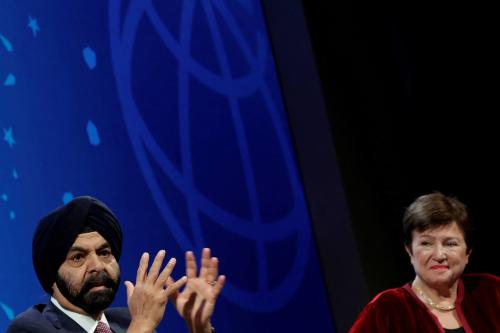A simplistic (actually, naive) view of markets is that they exist almost in a “state of nature,” and that the best of all worlds is one where they are free to operate without government interference. An equally simplistic view of democracy is that it is a political system in which periodic competitive elections give the winner the right to govern without constraint.
The reality is far more complex, of course. Markets can function only within an institutional and legal framework that includes property rights, enforcement of contracts, quality and information controls, and many other rules to govern transactions.
Similarly, while competitive elections are essential to any democratic system, a “winner-take-all” attitude to electoral outcomes, with the victor concentrating power, is incompatible with democracy in the long term. Well-functioning democracies are embedded in complex constitutional and other laws that separate executive, legislative, and judicial power, and that protect freedom of speech, assembly, and peaceful dissent by those who lose elections.
Regulatory institutions – such as bank supervisory agencies and bodies that oversee the telecommunications, food, and energy industries – play a vital role by maintaining the always-delicate balance between “free” markets and the actions of elected governments and legislatures. The central bank is perhaps the most important of these institutions, for it conducts monetary policy (and sometimes serves as the financial-sector regulator).
The policy and regulatory mistakes that contributed to the subprime mortgage crisis – and thus to the US financial system’s near-meltdown and the eurozone’s travails – have brought the issue of optimal economic regulation and its relation to democracy to the fore once again. In the US, a significant share of the Republican Party favor abolishing not only the Department of Energy and the Environmental Protection Agency, but also the Federal Reserve! In their view, markets and private initiative require no significant regulation. The role of politics is to elect majorities that can abolish regulations and regulatory bodies.
Others around the world similarly oppose regulatory institutions, but for very different reasons. They argue that politicians can regulate and supervise without intermediate bodies that have some degree of autonomy. In their minds, these bodies merely impede and constrain realization of the people’s will.
If an elected government wants a bank to offer cheap credit to a group of enterprises so that they can hire more people, why should a supervisor be able to obstruct this democratic will? If these enterprises are told to hire the governing party’s supporters as an implicit condition of obtaining subsidized credit, that, too, is the expression of electorally legitimized popular will.
Management of the economy should be entrusted to competent and independent experts, a group of “Platonic Guardians” empowered to act in the state’s higher interests, regardless of electoral outcomes or public opinion.
At the other end of the spectrum are technocratic super-defenders of regulatory bodies who believe that politicians and electorates are hopelessly confused, uneducated, and often corrupt. Management of the economy should be entrusted to competent and independent experts, a group of “Platonic Guardians” empowered to act in the state’s higher interests, regardless of electoral outcomes or public opinion.
The International Monetary Fund, the European Commission, and the European Central Bank are often viewed as such technocratic institutions – and as supporting the technocratic element within states and societies around the world. At the height of the eurozone crisis, the IMF, the EC, and the ECB (not to mention financial markets) warmly welcomed the economists Mario Monti and Lucas Papademos as highly respected “technocratic” prime ministers for Italy and Greece, respectively.
Experience in recent decades has shown that a balanced and “moderate” approach is needed on these matters. Electoral cycles (and the accompanying political pressures) are such that monetary policy, banking, and many other areas of policy and economic activity must be overseen by those with professional competence and a much longer time horizon than that of politicians.
Day-to-day politics cannot dominate the regulation that markets need. The single most important institutional reform underlying price stability throughout the world has been the stronger independence of central banks.
But, if independent technocrats are allowed to determine long-term policy and set objectives that cannot be influenced by democratic majorities, democracy itself is in serious jeopardy. I find it undemocratic, for example, that the ECB can set the eurozone-wide inflation target unilaterally. How much inflation a society finds desirable or tolerable (taking into account other important variables, such as employment, GDP growth, or poverty) is an inherently political question that should be debated in parliament. The central bank should be consulted, but its role should be to implement the objective without political interference: independence in terms of policy tools, not goals.
Globalization and the increasing complexity of financial and other markets make it imperative that the domains of private activity, political decision-making, and regulation be clarified. The challenge is even greater because some regulatory agencies must be multilateral, or at least intergovernmental, given the global nature of much economic activity. The difference and the distance between markets and politics must be clear – and, for the sake of both effectiveness and legitimacy, it must be based on rules that are well understood and on popular consent.



Commentary
Op-edBalancing the Technocrats
May 10, 2013